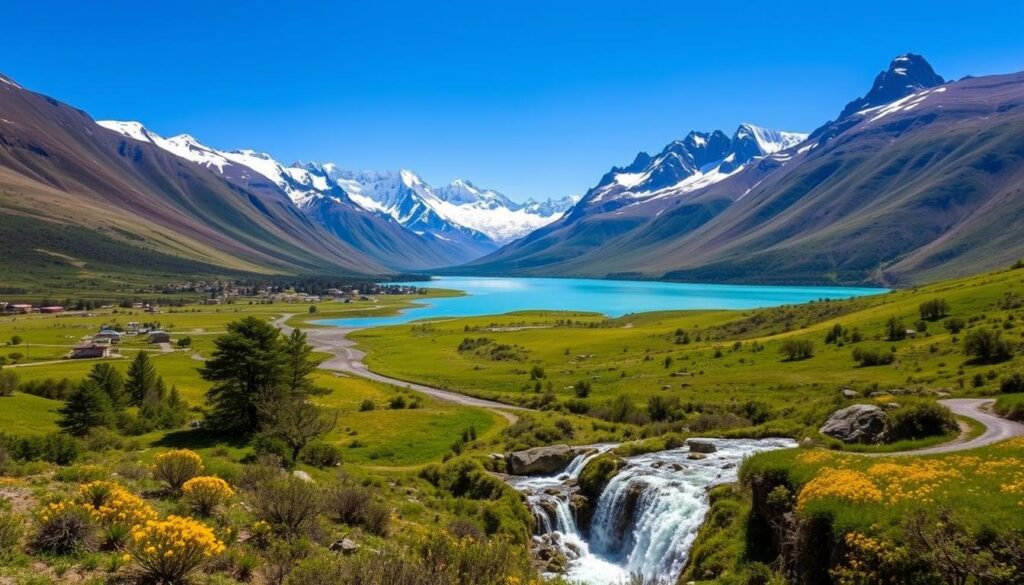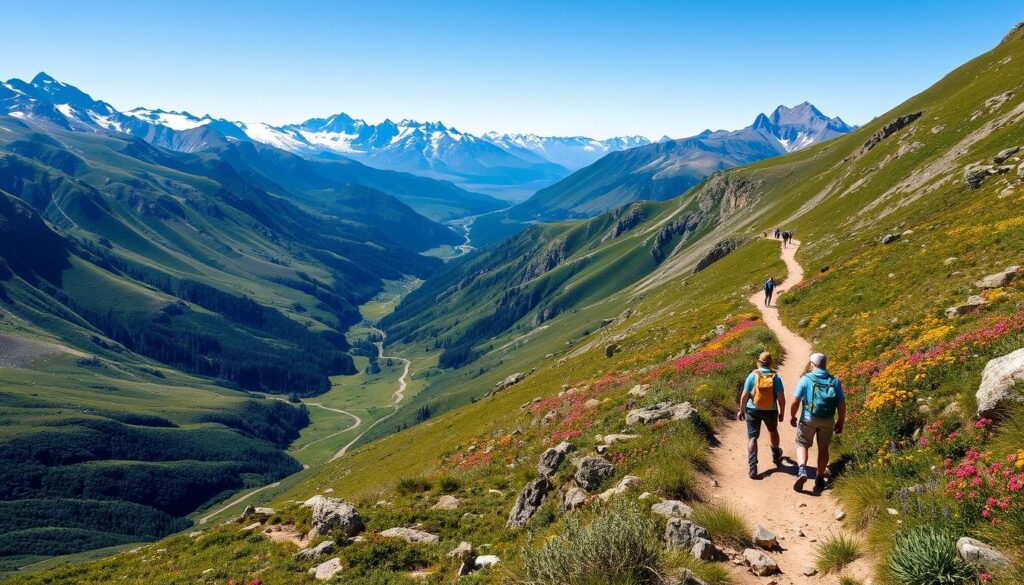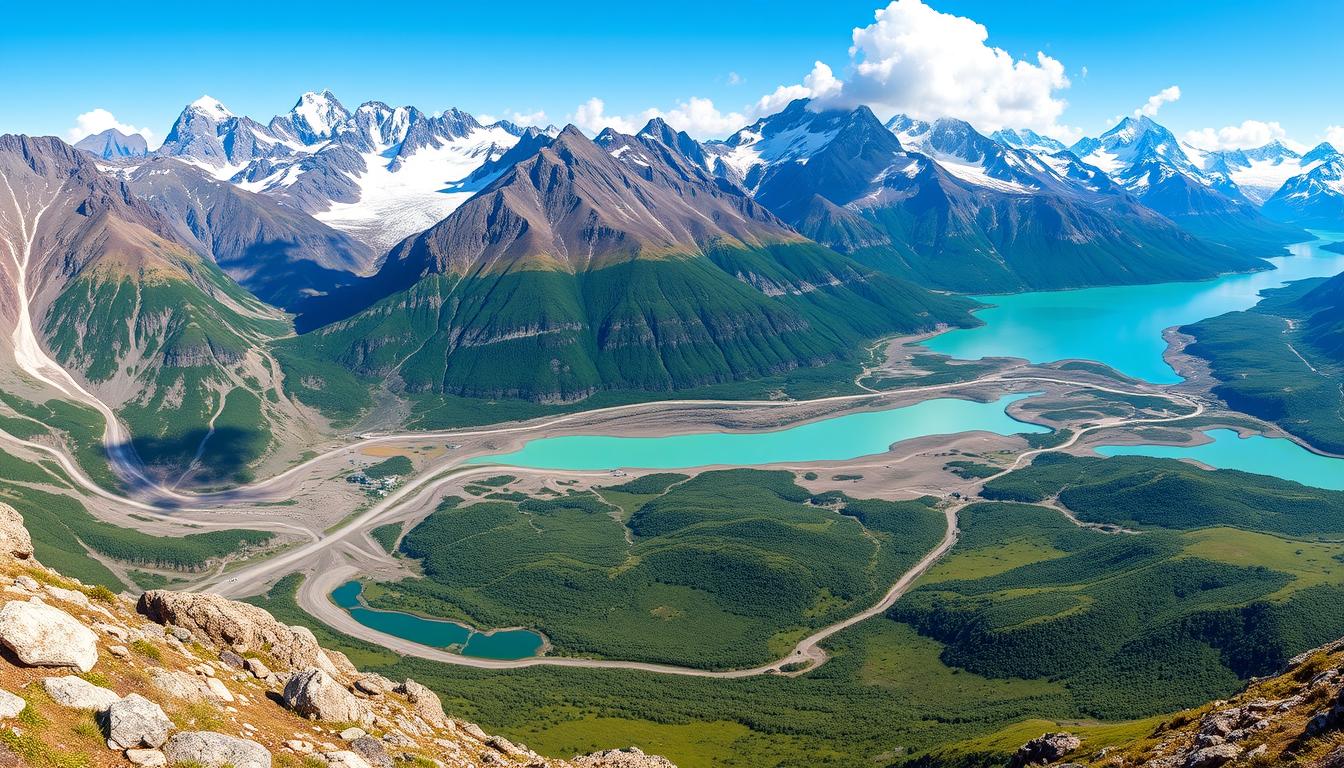“As an Amazon Associate I earn from qualifying purchases.” .
Are you ready for a journey that will push your limits and change how you see nature? Welcome to Patagonia, where the wild meets eco-friendly travel in 2025. This guide will take you through Patagonia’s stunning landscapes, from glaciers to steppes. You’ll have experiences that will last a lifetime.
Patagonia is becoming a top spot for eco-friendly travel in 2025. Its breathtaking views and diverse wildlife attract adventurers and nature lovers worldwide. Whether you dream of hiking in Torres del Paine or exploring Los Glaciares National Park, this guide will help plan your trip.
Imagine seeing the Perito Moreno Glacier up close, watching ice fall into the water. Or camping in Torres del Paine, surrounded by stars and mountains. These are the amazing experiences waiting for you in Patagonia in 2025.
There are tours for every traveler, from 3 to 20 days, for ages 16 to 99. Local guides will show you secret spots and share their knowledge. You’ll kayak in icy waters and eat under the stars. Your adventure in Patagonia will be unforgettable.
Key Takeaways
- Patagonia offers diverse landscapes from volcanic terrains to massive glaciers
- Adventure activities include camping, glacier trekking, and wildlife watching
- Local guides provide expert knowledge for a more immersive experience
- Tour durations vary from 3 to 20 days, suitable for ages 16-99
- Prices range from $975 to $7,799, with some tours featuring discounts
- Sustainable ecotourism is a growing trend in Patagonia for 2025
- Tours are available in English and Spanish, covering up to 12 destinations
Introduction to Patagonia Travel in 2025
Patagonia, shared by Argentina and Chile, is a top spot for Mindful Travel Experiences in 2025. It’s known for its vast, untouched landscapes and shy wildlife. Thousands of untouched Chilean islands are waiting to be explored, promising real Outdoor Exploration in Patagonia.
Overview of Patagonia’s Unique Appeal
Patagonia’s beauty comes from its untouched wilderness and famous landmarks. Torres del Paine National Park in Chile has three granite towers and the stunning Lago Grey. Los Glaciares National Park in Argentina has 40 glaciers, including the famous Perito Moreno.
Park entrance fees help protect Patagonia’s delicate ecosystems, fitting with the trend of responsible tourism. Families find it safe and welcoming. Adventure lovers enjoy its thrilling experiences.
Trends in Travel for 2025
In 2025, small group tours led by local guides are becoming more popular. These tours often include homestays for a deeper cultural experience. Hikers of all levels will find trails in Patagonia to suit their skills.
| Cancellation Period | Fee (% of Program Price) |
|---|---|
| 120-91 days prior | 20% |
| 90-61 days prior | 50% |
| 60 days or less | 100% |
Travel trends are changing, and flexible booking policies are becoming more important. The table shows cancellation fees for main group journeys. It shows how the industry is adapting to what travelers want in 2025.
Best Times to Visit Patagonia
Planning a trip to Patagonia is key. Each season has its own charm. Let’s look at the best times to see this amazing place.
Spring (September – November)
Spring awakens Patagonia. Wildflowers paint the landscape in colors. It’s mild, great for hiking and seeing wildlife. Photographers will love the awakening nature.
But, some places might be closed early in spring.
Summer (December – February)
Summer is the busiest time in Patagonia. The days are long, and the weather is stable. It’s perfect for outdoor fun. You might see penguins and whales.

Fall (March – May)
Fall is magical with its golden leaves. It’s quieter, great for those who want peace. Photographers will enjoy the scenery and light.
But, some trails might close as fall goes on.
Winter (June – August)
Winter turns Patagonia into a snowy wonderland. It’s perfect for winter sports and quiet. But, many places close, and it gets very cold.
July is the best for skiing with good snow.
| Season | Best For | Considerations |
|---|---|---|
| Spring | Hiking, Photography | Some closed facilities |
| Summer | Wildlife Viewing, Trekking | Higher prices, crowds |
| Fall | Photography, Tranquility | Unpredictable weather |
| Winter | Skiing, Snowboarding | Limited activities, cold |
Picking the right time is key to enjoying Patagonia responsibly.
Popular Destinations in Patagonia
Patagonia’s landscapes in 2025 are breathtaking for adventure lovers. It has glaciers, forests, and more, drawing visitors all year. Let’s look at three iconic national parks that show off Patagonia’s beauty.
Torres del Paine National Park
Torres del Paine is a dream for hikers, with its granite peaks and blue lakes. Summer is the best time to visit, with temperatures from 33°F to 48°F. The W Trek offers amazing views of the Cuernos del Paine.
Los Glaciares National Park
Los Glaciares is famous for the Perito Moreno Glacier. El Calafate is the entry point, with temperatures from 39°F to 62°F. You can see huge ice chunks break off the glacier face.
Tierra del Fuego National Park
Tierra del Fuego is known as the “End of the World.” Ushuaia, with temperatures from 39°F to 55°F, is where Antarctic trips start. The park has subantarctic forests and peat bogs.
| National Park | Key Feature | Avg. Temp Range (°F) |
|---|---|---|
| Torres del Paine | Granite Peaks | 33-48 |
| Los Glaciares | Perito Moreno Glacier | 39-62 |
| Tierra del Fuego | Subantarctic Forests | 39-55 |
These parks show what Patagonia’s landscapes in 2025 have to offer. From glacier hikes to wildlife watching, there’s something for everyone. Patagonia’s national parks promise unforgettable adventures.
Essential Activities for Adventurers
Ethical Patagonian Expeditions offer a treasure trove of thrilling activities for adventure seekers. From breathtaking hikes to wildlife encounters and exhilarating water sports, Patagonia promises unforgettable experiences in 2025.
Hiking and Trekking Trails
Patagonia boasts world-class hiking trails for all skill levels. The Dientes Circuit Trek is a top choice for seasoned hikers. For a gentler experience, the Laguna Capri hike offers stunning views without extreme difficulty.
These trails showcase Patagonia’s diverse landscapes, from towering peaks to glacial fjords.

Wildlife Watching Opportunities
Nature enthusiasts will delight in Patagonia’s rich biodiversity. Ethical Patagonian Expeditions offer chances to spot Magellanic penguins, sea lions, and guanacos in their natural habitats. Keep an eye out for Darwin’s Rheas and Andean foxes roaming the temperate rainforests and open plains.
The region’s abundant seabird population adds to the wildlife spectacle.
Water Sports and Activities
Patagonia’s waterways offer exciting adventures for water sports enthusiasts. Kayaking in Torres del Paine National Park allows for up-close glacier views. Zodiac cruises through Chilean fjords provide unique perspectives of the region’s stunning coastline.
For a truly immersive experience, some Ethical Patagonian Expeditions combine hiking, biking, kayaking, and horseback riding in multisport tours.
| Activity | Duration | Highlights |
|---|---|---|
| Dientes Circuit Trek | 4-5 days | Challenging terrain, breathtaking views |
| Wildlife Watching | Throughout the trip | Penguins, sea lions, guanacos |
| Kayaking | Half-day to full-day | Glacier views, fjord exploration |
Cultural Experiences to Explore
Patagonia is full of cultural adventures waiting for you in 2025. You can dive into local traditions and try the local food. Your trip will be one you’ll always remember.
Engaging with Local Communities
Get to know the real Patagonia by meeting the locals. Visit old estancias to learn about the gaucho way of life. You can even ride a horse like a true gaucho.
Meet local artists to see their traditional crafts. They’ll share stories of Patagonia’s rich history with you.
Traditional Patagonian Cuisine
Try the delicious food of Patagonia. You must have an asado, a big barbecue that’s a big part of their culture. Also, try mate tea, a favorite drink of locals.
These foods are key to experiencing Patagonia’s culture.
Festivals and Events in 2025
Make sure to visit during Patagonia’s lively festivals in 2025. You’ll see traditional music and dance. Watch gaucho shows to see their amazing horse skills.
These events are great ways to really feel the spirit of Patagonia.
| Tour Duration | Starting Price | Activities |
|---|---|---|
| 6-11 days | US$7,500 per person | Hiking, kayaking, fly fishing, horseback riding |
Patagonia offers many adventures and cultural experiences. From Torres del Paine to Ushuaia, each place has its own traditions and beauty. Your trip will be full of unforgettable moments.
Sustainable Travel Practices in Patagonia
Keeping Patagonia’s nature safe is key for its future. As travelers, we have a big role in protecting this beautiful place for future generations.
Eco-Friendly Accommodations
Look for hotels that care about the planet. Many in Patagonia use green energy and save water. By 2025, Patagonia wants to run all its places on 100% green energy, showing the way for hotels everywhere.
Responsible Wildlife Viewing
Be kind to animals by staying far away and listening to guides. Remember, 85% of Patagonia’s pollution comes from making things. Help by choosing products made from sustainable materials.
Minimizing Environmental Impact
Follow Leave No Trace rules when you visit. Use refillable water bottles and help local conservation projects. Patagonia plans to stop using new oil in its stuff by 2025, showing us how to be green.
- Choose tour operators that care about the environment
- Join tree-planting projects like the “100,000 Trees Project”
- Use green ways to travel to cut down on pollution
By making smart choices, we can keep Patagonia’s special places safe. Your actions now help shape the Patagonia of tomorrow.
Planning Your Itinerary
Planning your trip to Patagonia for 2025 is key to enjoying its beauty. A good plan lets you see the best of nature and culture. This ensures a memorable trip.
Suggested 7-Day Itinerary
Here’s a 7-day plan for an amazing Patagonian trip:
| Day | Location | Activities |
|---|---|---|
| 1-2 | Puerto Natales | Arrive, explore city, prepare for trek |
| 3-5 | Torres del Paine | Hiking, wildlife watching, Mirador las Torres |
| 6 | El Calafate | Travel to Argentina, town exploration |
| 7 | Perito Moreno Glacier | Glacier tour, ice trekking |
Key Considerations
When planning your Patagonia trip, remember these tips:
- Book accommodations early, for peak season (December-February)
- Budget for park entrance fees: Torres del Paine ($26) and Perito Moreno ($13)
- Be flexible for weather changes
- Plan for transportation: flights, buses, and taxis
Travel mindfully by respecting local cultures and nature. Patagonia is vast, so choose wisely. This plan covers both Chile and Argentina, mixing nature with culture.
Follow this guide for a memorable Patagonia trip. Start planning your 2025 adventure today!
Transportation in Patagonia
Exploring Patagonia’s vast wilderness needs smart travel planning. The region’s unique geography calls for a mix of transport methods. This is for those looking for Patagonian Wilderness Adventures.
Getting Around Between Destinations
Patagonia’s main entry points are Ushuaia and El Calafate in Argentina, and Punta Arenas in Chile. Flights from North America usually land in Buenos Aires or Santiago. Traveling between countries often means taking overland routes. This is because there are few direct flights between Chilean and Argentine Patagonia.
Recommended Modes of Transport
Buses link major spots, providing affordable travel with fares from $20 to $50 each way. For more flexibility, car rentals cost $50-$100 daily. Flying is quicker for longer trips. Cruise options allow you to see fjords and glaciers, fitting with Sustainable Ecotourism.
| Transport Mode | Cost Range | Best For |
|---|---|---|
| Bus | $20-$50 | Budget travel, scenic routes |
| Car Rental | $50-$100/day | Flexibility, off-beat locations |
| Flights | From $250 | Long distances, time-saving |
| Chauffeured Car | $100-$200/day | Comfort, guided experience |
Choose your transport wisely to enjoy your Patagonian adventure. This supports Sustainable Ecotourism in this untouched region.
Packing Essentials for Patagonia
Getting ready for Outdoor Exploration in Patagonia means packing smart. The area’s weather and rough terrain need the right gear. Here’s what you should pack to be ready for your trip.
Clothing for Varying Weather Conditions
Patagonia’s weather can change fast. Wear layers to stay comfortable. Bring two pairs of hiking pants and three T-shirts. Also, pack 2-3 days’ socks made of nylon-wool blend.
Gear for Outdoor Activities
For Outdoor Exploration in Patagonia, don’t forget these:
- Sturdy hiking boots
- Backpack (30-40 liters)
- Sleeping bag (15°F rating)
- Water bottle
- Trekking poles
- Sandals for evening lodge walks
Health and Safety Items
Keep yourself safe with these items:
- First-aid kit
- Sunscreen
- Insect repellent
- Prescription medications
- Portable battery pack
| Item | Quantity | Importance |
|---|---|---|
| Hiking pants | 2 | Essential |
| T-shirts | 3 | Essential |
| Socks (nylon-wool blend) | 2-3 pairs | Essential |
| Water bottle | 1 | Critical |
| Sunscreen | 1 | Critical |
Check your packing list twice before you leave. Bring US bills and an outlet adapter for your devices. With these items, you’ll be set for your Patagonian adventure.
Travel Tips for First-Time Visitors
Traveling to Patagonia needs careful planning. First-timers can make the most of their trip by following these tips. This way, they can enjoy Patagonia’s beauty responsibly.
Cultural Norms and Etiquette
When you visit Patagonia, respect the local ways. Argentinians often greet with a kiss on the cheek. Dinners usually start after 9 PM.
Tipping is common in restaurants, around 10% of the bill. Lamb dishes are popular because of the area’s sheep farms. This is different from beef.
Language Considerations
English is not common, so learning Spanish is helpful. Basic phrases like “Hola” (Hello) and “Gracias” (Thank you) are useful. A pocket dictionary or app can also help.
Must-Have Apps and Tools
Download maps and translation tools for offline use. Weather apps are key because Patagonia’s weather can change quickly. Apps for plants and animals can make your nature walks more interesting.
Bring clothes that can be layered for the weather. Good hiking boots are a must for long walks like the 13-mile hike to Laguna de los Tres. A waterproof jacket and warm hat are important for boat tours, like the 5-hour penguin watching trip in Ushuaia.
By following these tips, you’ll be ready for a great trip to Patagonia. You’ll enjoy the beauty of this place while showing respect for it.
Conclusion: Making the Most of Your Patagonia Adventure
As we conclude our guide to Patagonia travel for 2025, it’s clear this region is a treasure trove for adventurers. You’ll find everything from the towering peaks of Torres del Paine to the vast Perito Moreno Glacier. Ethical Patagonian Expeditions are gaining popularity, allowing you to explore while caring for the environment.
Reflecting on Your Travel Experience
Your trip to Patagonia is more than a vacation; it’s a journey that changes you. You might have hiked tough trails, seen amazing wildlife, or learned about the local culture. Each experience deepens your connection with nature and yourself. Don’t forget, the weather adds to the adventure, so enjoy every moment.
Future Travel Inspirations to Consider
When you plan your next trip, let the spirit of adventure lead the way. You could explore the Atacama Desert in Chile, known for its volcanoes and landscapes. Or visit the Galapagos Islands, famous for their unique animals. For more Ethical Patagonian Expeditions, try an overland trip from Chile to Bolivia for stunning views and cultural experiences.
Whatever your next adventure, remember the lessons from Patagonia. Share your stories responsibly, encouraging others to travel sustainably. Patagonia’s beauty is not just in its views but in the lasting impact it has on those who visit.
FAQ
What are the best times to visit Patagonia in 2025?
What are some must-visit destinations in Patagonia?
What sustainable travel practices can I adopt in Patagonia?
How can I experience Patagonian culture during my visit?
What are the transportation options in Patagonia?
What should I pack for a trip to Patagonia?
Are there any unique wildlife watching opportunities in Patagonia?
What are some essential travel tips for first-time visitors to Patagonia?
How can I plan a complete Patagonian experience?
What outdoor activities are available in Patagonia?
“As an Amazon Associate I earn from qualifying purchases.” .



